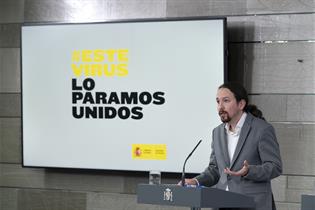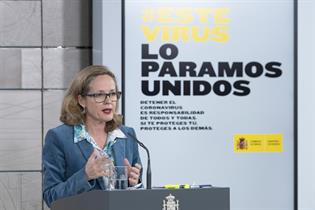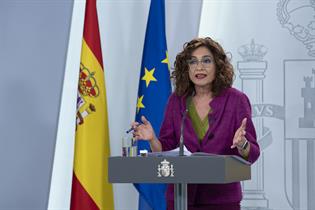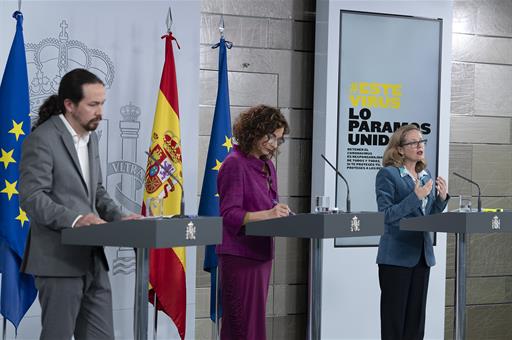Council of Ministers. Coronavirus COVID-19
Government adopts 50 new measures to extend protection for most vulnerable groups, companies and independent contractors
Council of Ministers - 2020.3.31
Moncloa Palace, Madrid
The Council of Ministers approved, through a Royal Decree-Law, more than 50 economic and social measures that complement those adopted in recent weeks and thus provide a response to the situations caused by COVID-19 and the declaration of the state of emergency.
The Minister for the Treasury and Government Spokesperson, María Jesús Montero, claimed that the initiatives comply with a threefold objective of strengthening the health system, sustaining the productive model and preventing inequalities deriving from this situation.
Right to housing and basic supplies
The Second Vice-President of the Government and Minister for Social Rights and 2030 Agenda, Pablo Iglesias, stated that the measures on the restriction on movement and suspension of work activities will only be viable if the State institutions offer citizens security and protection.
In this regard, Pablo Iglesias maintained that the Spanish Constitution should be taken as a reference for the protection of citizen rights, particularly of the most vulnerable, and extend this protection with measures such as those taken on Tuesday. These initiatives, he stressed, enhance "social shielding from the coronavirus and decisively place our country on the path of a social exit from this crisis rather than the path taken in the past".
Right to housing
 Pool Moncloa/Borja Puig de la BellacasaWith the aim of guaranteeing the constitutional right to housing, Pablo Iglesias announced that all rental contracts in force that are about to terminate may be automatically extended for six months. This measure, he said, will mean that "rent cannot be raised for any tenant in Spain with a contract in force", during this period.
Pool Moncloa/Borja Puig de la BellacasaWith the aim of guaranteeing the constitutional right to housing, Pablo Iglesias announced that all rental contracts in force that are about to terminate may be automatically extended for six months. This measure, he said, will mean that "rent cannot be raised for any tenant in Spain with a contract in force", during this period.
The Second Vice-President of the Government also explained that a system of public micro-credits will be set up, through the Official Credit Institute, without commissions or interest, so that all those in a situation of vulnerability can pay the rent on their primary residence. Those tenants that benefit from this public system can pay the money back in a period of six years, which may be extended to 10 years for those in difficulties.
In addition to this measure, those who are unemployed, workers affected by a reduction in their working day and independent contractors that have seen their income drop may sign up to this system.
Pablo Iglesias also indicated that if a tenant is in a situation of vulnerability and their landlord holds a portfolio of properties, like an investment fund, the latter will have to choose between two options: writing off half of the debt owed by the tenant or restructure this debt which may be paid over three years. This means, he pointed out "protecting tenants and small owners while guaranteeing that large real estate companies do their part".
At regards housing, the Second Vice-President of the Government announced that the recently approved moratorium on mortgages will be extended to include those independent contractors whose activity has been suspended by the state of emergency or whose invoicing has fallen significantly by the last day on the month in which the state of emergency ends. The creditor institution may not demand payment of the mortgage quota under any concept, including interest.
Ban on cutting off supplies
Pablo Iglesias also stated that the government ban on cutting off basic supplies to vulnerable households is also extended to all households. "While the state of emergency is in force, utility companies that supply electricity, water or gas may not suspend the service to the primary residence of any citizen".
The coverage of the social electricity voucher is also extended to workers affected by dismissals and independent contractors that have ceased their activity or seen their turnover fall as a result of the COVID-19 crisis.
Temporary unemployment benefit
Pablo Iglesias also highlighted the approval of a specific unemployment benefit for all domestic workers that have been forced to totally or partially stop rendering their services due to the crisis, or whose contract has terminated after the declaration of the state of emergency. "If we have learnt anything in this crisis, it is that it is essential to improve how we look after care providers, because it is precisely their care work, which often goes unseen, is insecure and undervalued, that is most essential in the task at hand, which is sustaining life".
Restriction on advertising gaming
In order to protect the most vulnerable consumers, a three-month moratorium has been agreed on the payment on personal loans.
The Second Vice-President of the Government also quoted such measures as the reimbursement of cancelled trips and restrictions on betting advertising, in a context of confinement that makes it even more necessary to protect those with a gambling problem.
Equality and fight against gender-based violence
The government has decreed care services for victims of sexual abuse and trafficking as essential, guarantees a safe alternative room for victims of gender-based violence and other forms of violence against women, and has passed an extraordinary subsidy for domestic workers.
Complementary social security and economic measures
 Pool Moncloa/Borja Puig de la BellacasaThe Third Vice-President of the Government and Minister for Economic Affairs and Digital Transformation, Nadia Calviño, explained that the Royal Decree-Law also contains specific measures on consumption, support for workers, the maintenance of the productive fabric - from independent contractors to SMEs and other companies - and others in different areas designed to cover needs detected over the course of recent weeks.
Pool Moncloa/Borja Puig de la BellacasaThe Third Vice-President of the Government and Minister for Economic Affairs and Digital Transformation, Nadia Calviño, explained that the Royal Decree-Law also contains specific measures on consumption, support for workers, the maintenance of the productive fabric - from independent contractors to SMEs and other companies - and others in different areas designed to cover needs detected over the course of recent weeks.
The Royal Decree-Law extends the duration of the exceptional measures already established by the government until one month after the end of the state of emergency, unless they have specific periods established, and include technical modifications to guarantee their effectiveness.
Support for economic activity and productive fabric
The Third Vice-President of the Government outlined the measures aimed at protecting companies and independent contractors, highlighting the moratorium of up to six months on the payment of obligations and the deferment of quotas to be paid in April at a reduced rate of 0.5%.
In addition, electricity and gas supply contracts are made more flexible for independent contractors and companies, as well as the terms and administrative procedures for companies. The payment of interest and repayment of loans for entrepreneurs, particularly in the tourism sector, is also suspended for a year.
The Ministry of Industry, Trade and Tourism will speed up and facilitate the management of subsidies, while the Foreign Credit Institute (Spanish acronym: ICEX) will reimburse to companies the expenses deriving from their participation in trade fairs that this body has cancelled.
Consumer protection
Agencies from which combined trips have been contracted (flights, hotels, excursions and care hire) may offer a one-year voucher to consumers affected, but, if not used in that time, the sum will be reimbursed.
In the case of contracts with language schools, halls of residence for students, gymnasiums and nursery schools, the company offers to recover the services once the state of emergency is over unless the customer opts for the repayment of the money.
Other measures
Nadia Calviño highlighted that donations to the public sector will be facilitated that aim to strengthen actions to combat COVID-19. It will also be compatible for healthcare workers that wish to re-join active service to receive their retirement pension, and the voluntary collaboration of public servants on the healthcare front will be made easier.
The recovery of amounts contributed to pension funds will be made more flexible to "alleviate liquidity needs" in homes, continued the minister.
In the field of research, special rules will be applied for contracts performed by universities and in the National Health System while measures will also be adopted in the culture, cinema and performing arts sector, catering for their specific characteristics.
Urgently controlling the epidemic is key to minimising damage to economy
Nadia Calviño stressed that the aim of all these measures is to continue weaving a network of social and economic security, in parallel with the health emergency, which remains the priority. The minister argued that the sooner we enter into a phase of greater control over the epidemic the more "long-term, serious and lasting" damage to the economy will be avoided, expressing her confidence in "us soon being able to talk about reactivation plans to boost the economy".
The Third Vice-President of the Government thanked the social stakeholders for their participation in defining some of the measures, and also praised the "responsible action" of companies and workers in this crisis, particularly to guarantee the continuity of food supplies, health material and other key services.
Strengthening protection for victims of gender-based violence
The Council of Ministers approved urgent measures to protect and assist victims of gender-based violence during the crisis cause by COVID-19.
The Government Spokesperson explained that informative and advisory services will continue to operate as they have been classified as essential, together with emergency centres and shelters, supervised flats, safe houses and other accommodation, both for victims of gender-based violence and sexual exploitation, and trafficking for sexual purposes.
One of the new features highlighted by María Jesús Montero is that hotels may be used as safe accommodation for victims in the event that there are not enough places available during the state of emergency in the centres designated to this end.
Another services that has been activated is psychological care via Whatsapp, in addition to the Care and Protection Hotline for victims of gender-based violence (ATENPRO), which continues to function as normal, and the informative and advisory hotline 016, and emergency hotline 112, 091 and 062, operational 24 hours a day.
Social confinement saves lives
 Pool Moncloa/Borja Puig de la BellacasaMaría Jesús Montero argued that the figures offered on Tuesday by the members of the technical committee, albeit taken with certain prudence, would seem to indicate that we are moving in the right direction and the pandemic is entering a stabilisation phase.
Pool Moncloa/Borja Puig de la BellacasaMaría Jesús Montero argued that the figures offered on Tuesday by the members of the technical committee, albeit taken with certain prudence, would seem to indicate that we are moving in the right direction and the pandemic is entering a stabilisation phase.
María Jesús Montero highlighted the "exemplary behaviour of citizens", calling on them to persevere, since social confinement saves lives and their responsible action is helping flatten the curve of contagions. "We all have a key role to play and we are proving to be effective because this is being made clear in the daily monitoring of the pandemic", she said.
Recoverable paid leave, she added, will also save lives and this has been made possible through an agreement with business owners and trade unions. Limited contact with the elderly and the vulnerable also saves lives. This sacrifice, she claimed, will be rewarded when we stop the virus and are able to gradually recover our daily activities.
14 tonnes of health material
The minister underlined that her department is strictly and closely monitoring the arrival of health material and the needs that are being satisfied and those that are pending.
She also recalled that a military plane landed in Torrejón on Monday from China with 14 tonnes of health material. The arrival of 2 million face masks for healthcare professionals, 180,000 pairs of protective goggles and almost 63,000 disposable gowns is due on Tuesday, which will be shortly thereafter distributed to regional health authorities.
María Jesús Montero also reported that, from 10 to 31 March, more than 10 million face masks have been handed out to patients and healthcare professionals and, over the course of this week, more material will arrive by plane to help restock the health system and other sectors that require these protective products, primarily care homes for the elderly.
The minister expressed her gratitude to health workers, to all public servants and to national industry, which is undergoing a quick process to convert production to manufacture face masks, respirators, sanitising gel and other essential products for healthcare professionals.
Non official translation





